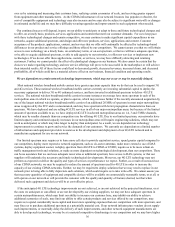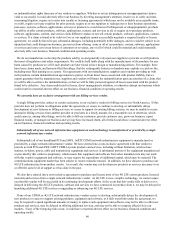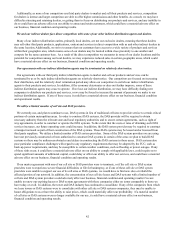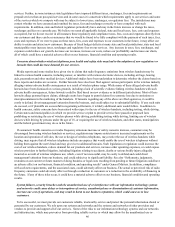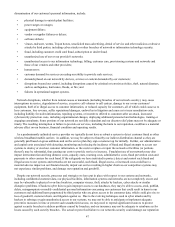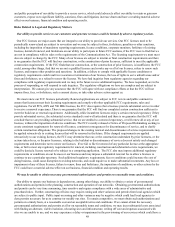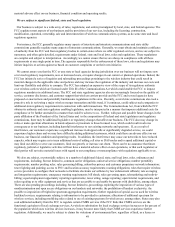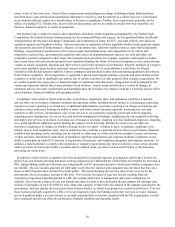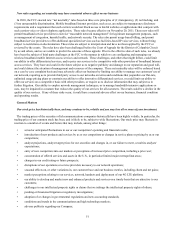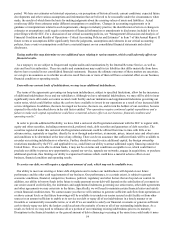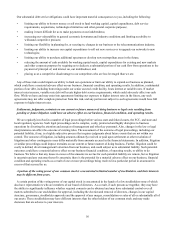Metro PCS 2011 Annual Report Download - page 57
Download and view the complete annual report
Please find page 57 of the 2011 Metro PCS annual report below. You can navigate through the pages in the report by either clicking on the pages listed below, or by using the keyword search tool below to find specific information within the annual report.46
services. Further, in some instances state legislatures have imposed different taxes, surcharges, fees and requirements on
prepaid services than on post-paid services and in some cases it is uncertain which requirements apply to our services and some
of the services which we compete with may be subject to lower taxes, surcharges, or regulatory fees. The jurisdictions may
contest whether we have assessed and remitted the taxes, fees and surcharges correctly or have complied with such
requirements. In addition, state and federal regulators periodically have and may in the future increase or change the taxes,
surcharges and fees we currently pay. We believe we remit all applicable federal, state and local taxes, fees, costs and expenses
as required, but we do not recover in all instances these regulatory and compliance taxes, fees, costs and expenses directly from
our customers and there can be no assurance that we would be found to be fully compliant with the payment of such taxes, fees,
costs and expenses. If we were to pass on these taxes, fees, costs and expenses to our customers in the future, it may affect our
ability to retain and attract new customers. Because of fiscal budget deficits at many state and local jurisdictions, state and local
municipalities may increase taxes, surcharges and regulatory fees on our services. Any increase in taxes, fees, surcharges, and
expenses could reduce our growth, decrease our revenues, increase our costs, reduce our profitability and increase our churn,
all of which could have a material adverse effect on our business, financial condition and operating results.
Concerns about whether wireless telephones pose health and safety risks may lead to the adoption of new regulations or
lawsuits that could decrease demand for our services.
Media reports and some studies have given rise to claims that radio frequency emissions from wireless handsets may be
linked to various health concerns, including cancer, or interfere with various electronic devices, including air bags, hearing
aids, pacemakers and other medical devices. Additional studies have been undertaken to determine whether the claims based on
these reports and studies are accurate. Further lawsuits have also been filed against various participants in the wireless industry
alleging various adverse health consequences as a result of wireless phone usage. While many of these alleged adverse health
lawsuits have been dismissed on various grounds, including a lack of scientific evidence linking wireless handsets with such
adverse health consequences, future lawsuits could be filed based on new evidence or in different jurisdictions. Most of these
lawsuits allege personal injury claims, although courts have begun to permit claims for economic loss due to omissions or
misrepresentations in the marketing of the handsets. If lawsuits regarding any of the above are filed against us, it could be
costly to defend, divert management's attention from the business, and could subject us to substantial liability. If any such suits
do succeed, or if plaintiffs are successful in negotiating settlements, it is likely additional suits would follow. In addition to
health concerns, safety concerns have been raised with respect to the use of wireless handsets, including texting, while driving.
Certain states and municipalities in which we provide service or plan to provide service have passed or proposed laws
prohibiting or restricting the use of wireless phones while driving, prohibiting texting while driving, limiting use of wireless
devices while driving by persons under the age of 18, or requiring the use of wireless headsets, and other states, municipalities
and the federal government may do so in the future.
If consumers' health concerns over radio frequency emissions increase or safety concerns increase, consumers may be
discouraged from using wireless handsets or services, regulators may impose restrictions or increased requirements on the
location and operation of cell sites, the use or design of wireless telephones, may restrict the use of wireless handsets while
driving, may require that all wireless telephones include an earpiece that would enable the use of wireless telephones without
holding them against the user's head and may give rise to additional lawsuits. Such legislation or regulation could increase the
cost of our wireless handsets, reduce demand for our products and services, increase other operating expenses, or could expose
wireless providers to further litigation, including litigation relating to accidents, deaths or serious bodily injury allegedly
incurred as a result of wireless telephone use, which, even if not successful, may be costly to defend and could divert
management's attention from our business, and could subject us to significant liability. See also “Settlements, judgments,
restraints on our current or future manner of doing business or legal costs resulting from pending or future litigation could have
an adverse effect on our business, financial condition, and operating results” under General Matters. In addition, compliance
with such new requirements, and the associated costs, could adversely affect our business. The actual or perceived risk of radio
frequency emissions could adversely affect us through a reduction in customers or a reduction in the availability of financing in
the future. If any of these risks occur, it could have a material adverse effect on our business, financial condition and operating
results.
System failures, security breaches and the unauthorized use of or interference with our information technology systems
and networks could cause delays or interruptions of service, unauthorized use or dissemination of customer information,
increase our cost of operations, and may result in harm to our business reputation, which could cause us to lose
customers.
To be successful, we must provide our customers reliable, trustworthy service and protect the personal information shared or
generated by our customers. We rely upon our systems and networks and the systems and networks of other providers and
vendors to provide and support all of our services. Some of the risks to our information technology systems and our networks
and infrastructure, which may prevent us from providing reliable service or which may allow for the unauthorized use or


